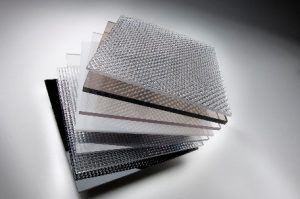 There have been various tests on polycarbonate to see what its chemical resistance is has against chemical substances. Chemical resistance is tested by exposing Polycarbonate to substances such as Alcohols, Ammonias, Bleaching Lye, Hydrogen Peroxide and a host of other substances. Charts are available that detail what kind of reaction polycarbonate had when exposed to ‘x’ substance. It’s particularly helpful to understand how the polycarbonate sheet material will change or modify when exposed to a host of chemicals and acids.
There have been various tests on polycarbonate to see what its chemical resistance is has against chemical substances. Chemical resistance is tested by exposing Polycarbonate to substances such as Alcohols, Ammonias, Bleaching Lye, Hydrogen Peroxide and a host of other substances. Charts are available that detail what kind of reaction polycarbonate had when exposed to ‘x’ substance. It’s particularly helpful to understand how the polycarbonate sheet material will change or modify when exposed to a host of chemicals and acids.
The reactions are broken down into 4 different reactions: 1) No attack, or possibly light absorption. Negligible effect on mechanical properties, 2) Slight attack by absorption / small reduction in mechanical capabilities, 3) Moderate attack of appreciable absorption / material will not last, 4) Material will decompose or dissolve in a short period of time. Polycarbonate chemical resistance is the worst against substances such as Acetic Acid Solution, Ammonium Carbonate Solution, Benzene, Chloroform, Ethyl Acetate, Methyl, Ethyl Ketone, Methyl Chloride, and Toluene. When
Tests such as these provide information on how a plastic, such as polycarbonate, will change and modify their structure. This amorphous thermoplastic holds up nicely against other chemicals such as Aluminum Chloride Solution, Aluminum Sulphate Solution, Citric Acid Solution, Freon 12 or Arcton 12, Formic Acid Solution, Glycerine, Hydrochloric Acid Solution, Hydrofluoric Acid Solution, Hydrogen Peroxide, and others. Substances such as: Ethylene chloride, chloroform, tetrachloroethane, m-cresol, and pyridine can greatly affect polycarbonate, and in many cases partially dissolve it.
Substances such as benzene, chlorobenzene, tetralin, acetone, ethyl acetate, acetonitrile and carbon tetrachloride can affect polycarbonate and make it swell or change color. Some of these substances cause stress cracks in the plastic that may or may not be visible to the naked eye. Stress cracks are most certainly a critical problem and will result in polycarbonate sheet failure.
You can easily order polycarbonate sheet from any of our over 70 locations. You can order polycarbonate sheet materials in the following types: General Purpose, Sign, Multiwall, Abrasion Resistant, Aircraft, FDA, Flame Retardant, Graphic, High Optic, and Machine Grade. The world’s most popular type of polycarbonate sheet has been LEXAN® since its inception.